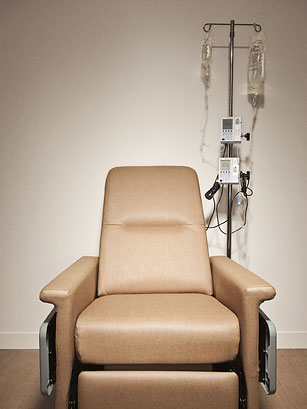
Patients who decline chemotherapy are often fearful of the side effects
(3 of 3)
Care by Other Means
While personality is a big factor in declining care, other variables particular to the type of cancer or the demographics of the patient can play a role. Older women with breast cancer are more likely to decline surgery, chemotherapy or radiation, for example. In one survey of women with breast cancer, 7% of women 65 or older refused treatment, compared with 3% of women under 65. Men with prostate cancer often postpone surgery out of concern about adverse effects such as incontinence and impotence, and indeed, watchful waiting and monitoring PSA levels are sometimes a doctor-approved option. Usually, however, a patient is not given much time to deliberate, a complaint that's often cited by supporters of complementary and alternative medicine (CAM).
One study found that 14% of cancer patients who use CAM decline conventional treatment, but their reasons are different from other refusers'. Often, they have had a negative experience with mainstream medicine and have probably relied on CAM before, although not always to the exclusion of traditional care. "Sometimes they'll wind up going back to conventional treatment — and the majority actually use both, which is probably the best route — but we've interviewed people in later stages, and we have not heard a lot of regrets about the decisions they've made," says Marja Verhoef, a professor of complementary medicine at the University of Calgary. "I don't think they're much liked by oncologists, but they've really thought about what life means." (The NIH's Center for Complementary and Alternative Medicine cautions that CAM should never be used as a replacement for conventional care and that "at present, there is no convincing evidence regarding CAM use in preventing or curing cancer.")
Understandably, doctors find it hard to take when their treatment paradigm is challenged. "They will be very troubled by the patient's decision and will keep trying to get them to change their mind," says Madjar, who has interviewed oncologists about their experiences with patients who have forgone treatment. "Others will be concerned to cover themselves in case the patient or the family later decides to sue for inadequate care. Others take a very detached view and simply rationalize that, having given the options to the patient, they have no further responsibility."
A New Collaboration
In an ideal world, instead of debating the merits of a particular treatment, a doctor would take the opportunity to initiate a different but equally important conversation about how patients want to live for however much time they have remaining. According to Holly Prigerson, director of the Center for Psycho-oncology and Palliative Care Research at the Dana-Farber Cancer Institute, who has done long-term surveys of how people cope with cancer, one big predictor for quality of life is the therapeutic alliance between doctor and patient. This is because a good relationship helps ensure that, even when patients forgo chemotherapy or radiation, they continue to have access to pain medication and other treatments that help keep them comfortable and functional.
Such palliative regimens are important for patients who are still pursuing treatment too. In a surprising study of people with advanced lung cancer, published in the New England Journal of Medicine last year, those who were given palliative care early in the course of their treatments not only reported a much higher quality of life and were much less depressed but also survived on average almost three months longer.
Reflecting on his patient, the widow who had responded to antidepressant medication but refused surgery and chemotherapy for her lung cancer, psychologist Sean Ransom now says, "At the time, it felt like a failure, but I would treat her much differently today than I did then. Sure, I'd assess for depression and try to help her feel like fighting, but I'd also ask her about her conceptualization of life beyond the bounds of mortality and how that might have factored into her choice to not have treatment. I'd ask what she thinks things will be like when she moves beyond this world, if she thinks she'll see her husband again and what that might be like for her. Perhaps then I'd really understand more about why she made the choice she made and what I needed to do to be of greatest service to her — regardless of what that service needed to be."